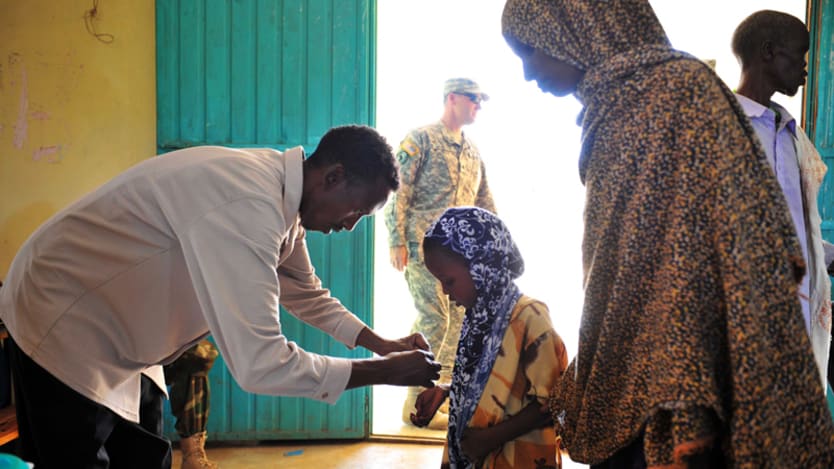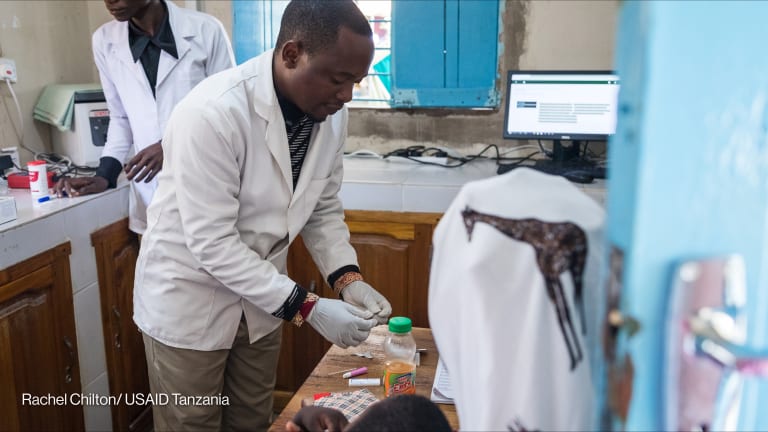
In the push to achieve the 2030 sustainable development agenda, the United Nations has outlined the need for investment from all sectors. Through blended finance, grants, trust funds and bonds, as well as corporate social responsibility, private sector investment has become an increasingly important financier of development. But with many of these efforts running in parallel to public investment, could enhanced collaboration across sectors improve health care impact?
At the G-20 meeting on global health innovation last month in Berlin, Germany, cooperation was a key theme. More knowledge sharing, mapping and increased input from a multitude of stakeholders to tackle global health threats such as neglected tropical diseases was just one call to action.
Dr. Michelle Gayer, acting senior director of emergency health at the International Rescue Committee, explained why synchronized efforts for financing health care initiatives in developing countries were needed.
“The world is at an unprecedented level of crises,” Gayer told Devex in an interview. “Now you need so much more coordination and collaboration because there are so many pieces to the puzzle and you don't want to duplicate when you've got such limited resources in the world.”
Robert Terry of the World Health Organization’s special program for research and training in tropical diseases, said during the event: “The G-20 countries, including those that aren’t particularly active, have an opportunity to come together to create core funding mechanisms. [Research and development] is risky, so pooled funding shares that risk and the benefits.”
Devex spoke to several meeting attendees to ask what steps could improve collaboration within the global health space toward meeting the 2030 sustainable development agenda. Here are five key takeaways from these discussions.
1. Outline the benefits of shared investment.
When it comes to public and private sectors working together to fund health care initiatives, making clear the shared purpose and the potential benefits for each investing organization could encourage that collaboration. Dr. Kei Katsuno, director of the Global Health Innovative Technology Fund, a facilitator for international partnerships fighting against infectious diseases, said philanthropic organizations, including the Bill & Melinda Gates Foundation and The Wellcome Trust, could also benefit from having such advantages outlined.
See more Going for Goals stories:
► Going for Goals: How to innovate on health sector financing
“Obviously these organizations are philanthropic, but there should be a rationale or a reason for them to actually get involved in this,” said Katsuno, adding that via the GHIT fund they would have almost direct pathways to work with the pharmaceutical industry and research organizations.
It may not always be immediately clear to potential investors what they can get out of a partnership with a government or private company, but by detailing the possible benefits of increased access, expertise and reduced risks, more players might be likely to tackle the issues of health in tandem.
2. Catalyze the political conversation.
Galvanizing a conversation around issues of global health within national and international political conversations can also encourage cooperation. Statistics, case studies and project outlines on issues such as maternal health and endemics as part of advocacy efforts can help to better inform politicians and other decision-makers and increase the likelihood of further investment.
This latest G-20 meeting did just that by bringing neglected tropical diseases and pandemics to a global forum in order to push national governments to act.
However, Patricia Nicklin, executive vice president of corporate partnerships at Reingold, a public affairs agency for social change, said that after the initial awareness raising, action was important.
“Once that question is asked and once this meeting is held, follow up and say ‘what do we actually [need] do to execute it,’ not just feel that it's a call to action and everyone should do it, but [ask] ‘what's the operational plan to make it happen?’”
3. Demonstrate impact.
Once the political conversation has been set in motion, and prior to determining the call to action, laying out evidence of previous impact is key.
Alan Donnelly, former leader of the United Kingdom’s Labour Party in the European Parliament and the executive chairman of Sovereign Strategy, a strategic planning consultancy, said that stakeholders want evidence of value for money.
“I think we’ve got to provide the information and the data; the power of data is now absolutely extraordinary,” he said. “Governments and institutions will be looking for transparency because they have to convince their public that this money is going to be used properly.”
If a clear plan can be presented showing how project funding is being spent, its likely impact, and evidence of previous successful investments, businesses, corporations and even governments are potentially more likely to invest — especially when, WHO’s Terry suggested, pooled finances mean reduced risks to that investment.
4. Perfect communication.
“If we sit down with people in the industry, they are very specific on what their objectives are and we, as a nonprofit sector and as a government sector, need to be really specific about the goal.”
— Patricia Nicklin, executive vice president of corporate partnerships at ReingoldBeyond laying out the data, the way in which this information is communicated is also important, said Reingold’s Nicklin.
“If we sit down with people in the industry, they are very specific on what their objectives are,” she said. “I think most people are ready if you explain the impact you want to have and the specific call to action. If it's a good one, and the impact you're going to have will have a significant effect, then the ability to get funding for that is much higher, and I think people will want to collaborate.”
Discussing written communications, Sovereign Strategy’s Donnelly said that smaller amounts of information, delivered more often and to a much wider audience is helpful. He also emphasized that organizations need to be more effective in showing the tangible impact their work is having if they want to generate a positive response to funding.
5. Engage at the local level.
Another step toward enhancing collaboration is to look at partnering with those countries affected by the health issues being tackled.
Nicklin said that the commitment of countries to invest in health is really critical and should be demanded by international donors. “But I think we can leverage our investments from a global level by co-investing with those countries in their challenges,” she added.
This means collaboration between the global north and south, as opposed to solely relying on developed countries coming together to invest in problems primarily found outside their own countries. The GHIT fund’s Katsuno said, however, that it wasn’t just about nonprofit organizations making the move to work at a local level, but businesses too.
“Not only from the philanthropy perspective or CSR perspective, private sector companies also need to look at deeper markets outside of the developed countries, but rather those developing countries,” he said.
These five steps could encourage others to take the plunge into funding partnerships, but do you have examples of other successful steps that have led to collaboration? Leave your thoughts in a comment below.
Freelancer Abby Young-Powell contributed reporting.
Over 10 weeks Devex and our partners will take an in-depth look at the innovative financing mechanisms driving forward the 2030 sustainable development agenda. We’ll explore how the funding gap can be filled, ask how cross-sector collaboration can lead to improved global health care, and look at what it takes to build successful partnerships for change. Join us as we examine the innovative financing powering the Global Goals by tagging #Going4Goals and @devex.
Search for articles
Most Read
- 1
- 2
- 3
- 4
- 5








